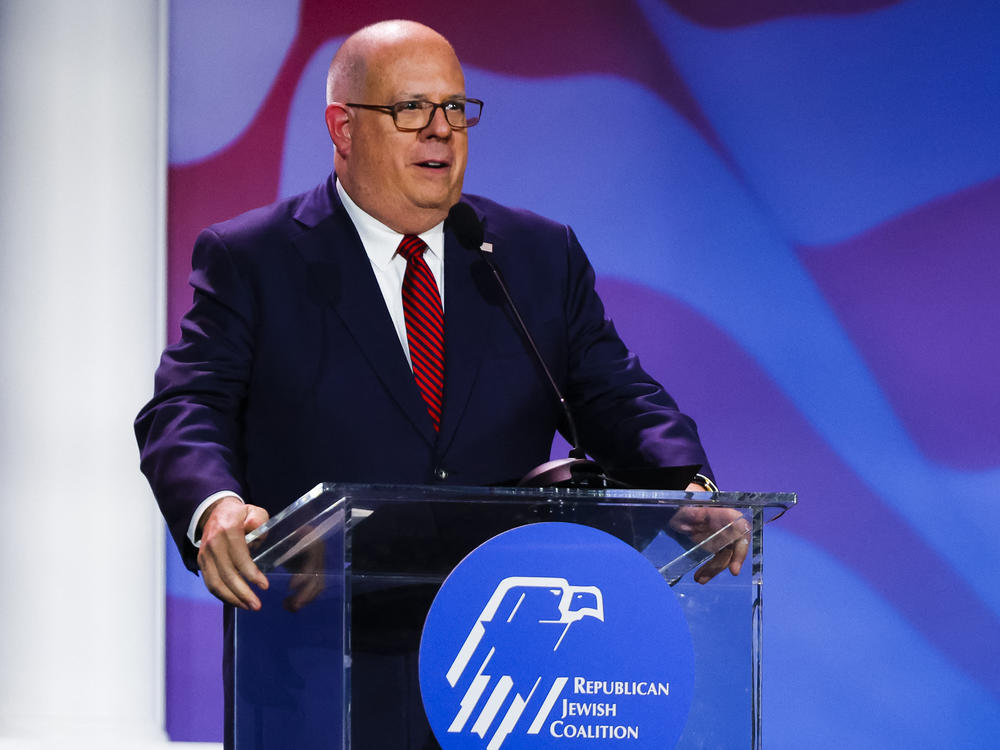Section Branding
Header Content
Larry Hogan won't run for president, but has some advice for the Republicans who do
Primary Content
Former Maryland Gov. Larry Hogan said over the weekend that he won't seek the Republican presidential nomination, ending a lengthy period of consideration and the hopes of those who had wanted the moderate — and vocal critic of former President Donald Trump — to throw his hat in the ring.
Hogan knows a thing or two about reaching across the aisle, as just the second Republican governor to win reelection in Maryland (where Democrats outnumber Republicans by a 2-to-1 margin). He finished his second term in January.
Some moderate Republicans had hoped Hogan would challenge Trump in 2020 as well as 2024, a decision that he ultimately decided against in both cycles.
Announcing his decision in a Sunday New York Times op-ed, Hogan said he cared more about ensuring a future for the Republican Party than securing his own future within it. And, expressing his concerns about the upcoming election, he urged his GOP colleagues to "move on" from Trump and work towards a "common-sense conservative vision."
Trump faces three Republican challengers so far: his former U.N. ambassador Nikki Haley, entrepreneur Vivek Ramaswamy and Michigan businessman Perry Johnson.
More are expected to enter the primary field in the coming months, including Florida Gov. Ron DeSantis, a Trump rival who has gained national prominence by waging a culture war against ideas and policies he considers "woke."
Hogan thinks that approach may help DeSantis win a divided primary, but doesn't see it as a path to the White House. And, he tells NPR, his own story is proof of that.
"I'm the complete opposite of that style," he says. "I won in the bluest state in America and was only the second Republican reelected in the entire 248-year history of our state, and I ran 45 points ahead of Donald Trump by winning over swing voters and independents and suburban women and Black voters and Asians and Hispanics."
Hogan spoke with Morning Edition's Steve Inskeep about his concerns about the state of his party and what he'd like to see it do differently in the upcoming election.
"If the Republican Party wants to get back to winning again, so that they can govern, then they're going to have to have a message that appeals to a wider group of people," Hogan says. "And I think kind of doubling down on the rhetoric just to appeal to the base may backfire in a general election."
This interview has been edited and condensed for clarity.
Interview highlights
On the issues he'd like to see Republicans prioritize
One of the things that I was concerned about was that the party was focusing on things that were not what the average person was focusing [on]. That's why we have continually been losing elections of late. It should have been a big election year ... last year; we lost races all across the country. Everybody who was ... talking about the stolen election or the virus as being fake, or talking about Jan. 6 and not talking about things like the economy and crime and education, most of them all lost.
And the people who won were common-sense conservative Republicans, or more traditional Republicans, that were focused on pocketbook issues and the things that the average person wanted to hear about.
On whether he thinks the GOP has abandoned the idea of limited government
I did an op-ed in the New York Times a couple of days ago saying that I was dropping out of the race and I wanted to see the Republican Party return to a more traditional Republican Party, which was all about smaller government, but that's not what we're seeing from a lot of the other folks that are out there. There's a big focus on social issues and in some cases on the government getting more aggressive.
On Republicans' focus on social issues and promoting traditional values
That's certainly what some of the right in the Republican Party are talking about and it seems to be playing with a certain segment of the primary base. Now I'm not sure whether it's a winning message for a nominee or for a general election, but it is playing well at this point in time for certain groups ...
... No question, these things get a lot of attention on conservative media and that's why you have some people talking about them nonstop.
The audio interview was edited by John Helton and HJ Mai.
Copyright 2023 NPR. To see more, visit https://www.npr.org.
Bottom Content

